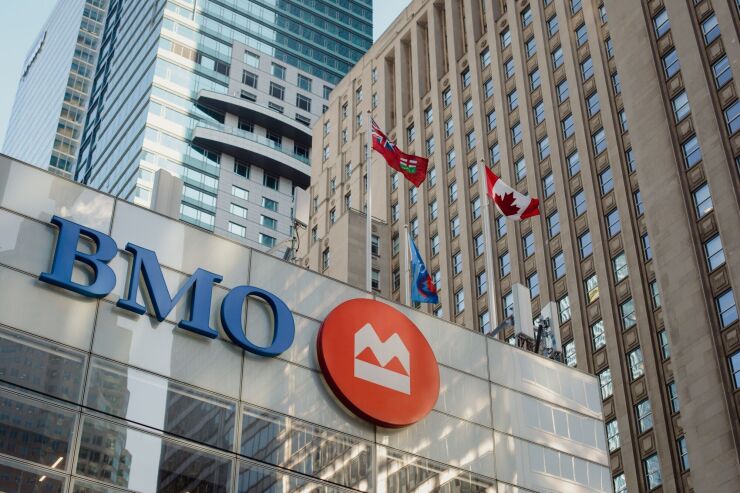
BMO Financial Group warned Tuesday that its operating performance this year will be impacted by the tariffs that the Trump administration plans to impose on Canadian and Mexican imports.
The third-largest Canadian bank by assets derives 40% of its earnings from the United States. It is already seeing clients on both sides of the border take a more cautious approach to capital deployment, CEO Darryl White said during the company's quarterly call.
Market uncertainty driven by
"We're seeing some clients effectively hit the pause button on some of their commercial activity, waiting for clarity," White said. As a result, BMO is "working through various scenarios … with our clients. And, you know, our focus has been to control what we can."
President Donald Trump's threat to impose 25% tariffs on imports from Canada and Mexico, the United States' two largest trading partners, has added another layer of economic uncertainty for North American businesses, including banks. Days after Trump began his second term, he issued an executive order saying he would implement tariffs against the two countries starting Feb. 1.
On Feb. 4, Trump put his plan on hold for 30 days after Canada and Mexico agreed to work on border security. Then on Monday, Trump said at a news conference that tariffs against both countries are "on time and on schedule" in response to a question about whether Canada and Mexico have done enough to avert them. He did not mention a start date, but March 4 is the current deadline, based on the 30-day delay.
Analysts on BMO's earnings call were anxious to hear about how the bank is preparing for the disruption that tariffs will cause and how the situation may play out for U.S. and Canadian commercial clients.
White was hesitant to make any predictions, noting how quickly things can change.
"We're only 24 days into this, and the shelf life of any prediction within those 24 days has been, you know, worth about 24 hours," White said. "So it's difficult to figure out where all this lands."
BMO was one of two big Canadian banks that reported their first-quarter earnings results Tuesday. The Bank of Nova Scotia, which recently completed its
Royal Bank of Canada and Toronto-Dominion Bank are scheduled to report on Thursday.
For the quarter that ended Jan. 31, BMO reported net income of 2.1 billion Canadian dollars, up from CA$1.3 billion in the year-ago period. Earnings per share came in at CA$2.83, well above analysts' expectations of CA$2.40 per share, according to S&P Capital IQ.
In a research note, Jefferies analyst John Aiken said that both BMO and Scotiabank posted "solid results … buoyed by the one-two punch of solid credit performances and robust contribution from capital markets revenues."
BMO has been
While executives this week signaled they could accept policies that put pressure on the economy, analysts said the lighter regulatory touch is unlikely to offset Trump's tariff regime.
The company set aside CA$1 billion in provisions for credit losses during the quarter.
It was the fifth consecutive quarter where BMO's provisions outpaced the year-ago total. But it was a step-down from provisions in the fourth quarter, which totaled CA$1.5 billion, the bank said.
Whether provisions continue to creep up remains to be seen, due to the tariff situation, Agrawal said.
"I understand this is hard," he said in response to an analyst's question about what to expect if 25% tariffs are imposed. "We don't know the duration. We don't know what percentages will be. We don't know which industries might get excluded. We don't know what monetary, fiscal policy actions the government might take here to mitigate some of the impact."
BMO is now two years out from
The U.S. environment is now poised to be "more constructive," which should help BMO achieve its companywide medium-term return on equity target of 15%, Chief Financial Officer Tayfun Tuzun said Tuesday.
For the first quarter, ROE was 10.6%, the company said.






